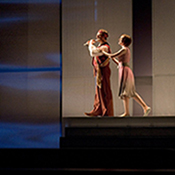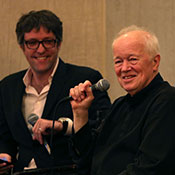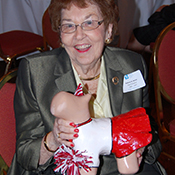
MSO joins Florentine Opera Company to commemorate 85 years
David Lewellen
PUBLISHED
Tagged Under: 2018.19 Season, opera, Partners
Maggey Oplinger came to the Milwaukee Symphony in 2015, about a year after a funding crisis nearly caused the orchestra to close. She watched and participated for the next four years as the MSO charted a new course toward sustainability. And when the Florentine Opera had an opening for general director and CEO, she wanted to bring what she had learned from the orchestra to the opera.
Oplinger’s hiring at the Florentine, announced in February, is a new chapter in the decades-old relationship between the symphony and the opera, which continues this weekend with the Florentine’s concert, “A Night at the Opera,” in Uihlein Hall, accompanied by the MSO.
A Milwaukee area native, Oplinger trained as an opera singer and spent some time in Europe before coming home. She held several corporate and nonprofit jobs before joining the MSO as its director of shared experiences in 2015. But the common factor in her wide-ranging resume, she said, was that “I loved tackling big problems in little steps. The MSO was the first place where it all came together, where I could use my creativity.”
As the organization improved its financial situation, committed to moving into a new hall, and searched for a new music director before announcing the hire of Ken-David Masur, “it was a time of great transformation that I found really exciting, with a deep breath and both feet on the ground,” Oplinger said. “And everything I’m describing, we’re trying to do here.”
The top job at the Florentine came open in May 2018, when the previous director, William Florescu, resigned following allegations of sexual harassment. The opera did a national search for a new leader, “and Maggey was here in our own back yard,” said Mary Read, a life director of the company who chaired the search committee. “She brought all the leadership skills we needed, and I personally think it’s important to have a woman leading the company for the first time in 85 years.”
The Florentine consulted with other artistic leaders in Milwaukee as part of its process, Read said, and the company was impressed with “the strength of her presentation, the depth of her leadership, and her connections with the artistic community in Milwaukee. She’s so commanding and so knowledgeable of the artistic world.” The 2019.20 season had already been planned before Oplinger came on board, but Read said that the new director will be open to collaboration with other arts groups, while also consulting with other opera companies about their plans.
Part of the challenge will be to define the Florentine’s core identity. “We want to find up-and-coming artists who are about to be stars,” Oplinger said, “in the Mozart, Verdi, Puccini that is our core repertoire.” The March performance slot “is our playground,” where the company can experiment a little.
Aside from artistic leadership, the Florentine faces financial challenges of its own. Historically, the model was to present three fully staged operas per season in Uihlein Hall, with the MSO in the pit. But about five years ago, the opera company changed its March production to a smaller-scale piece in Vogel Hall, usually accompanied by another ensemble. Oplinger sees it as an opportunity for more intimacy and interpretive freedom, but she said it’s possible that those productions will use some MSO musicians in the future.
This weekend’s concert replaces the fully staged production of Beethoven’s opera Fidelio which had been announced last spring. The change, which was made before Oplinger was hired, was necessary for the company to “rightsize itself and move forward,” she said. But a concert full of hits from Carmen, La Boheme, The Marriage of Figaro, and many more is “a delicious smorgasbord opportunity,” she said. “It’s an overwhelming march of great music.”
In that format, she said, audience members can realize “hey, that duet is from a movie, or I heard that solo in my car. It’s a parade of different styles at one go. And the MSO knows how to shift styles and respond to the soloist.”
For an opera company of the Florentine’s size, to have a full-time orchestra in the pit is “a real luxury,” Oplinger said. “Partnering with an organization of that stature requires bending on both sides.” The MSO sometimes presents a full opera in concert on its own programming, such as Wagner’s The Flying Dutchman this past January. “There’s an appetite for opera in Milwaukee,” Oplinger said, and the two organizations will talk to each other about repertoire plans.
The Florentine will also expand the number of artistic voices contributing to its season, beginning with the recent hire of Francesco Milioto as the company’s artistic advisor. Milioto, a conductor who has worked with many of the country’s leading opera companies, should be “a great pleasure for the MSO side and the Florentine side,” Oplinger said. “I feel so lucky that he’ll be working with us.” And speaking generally of musicians and directors that she knows, she said, “Anyone I can piggyback on, the earlier I can hear about it and the faster I can rightsize it for our company, the better. We’re always expanding our network of people to work with. We’re not limiting what we bring to Milwaukee audiences.”
In the past, the Florentine made a point of originating its own productions and not renting sets, costumes, and directorial concepts from other companies. But that model is changing as more companies share expenses for new productions that can be mounted in different houses, and it fits with the kind of collaboration that Oplinger envisions.
But opera still carries associations to casual arts-goers that are hard to overcome, Oplinger said. “It’s suspect, even for people who like classical music performed by a singer. I wonder how we’re going to jump that hurdle.” She still remembers, as a Nicolet High School student, taking a trip to see Tosca at the Florentine with her high school choir. And in coming seasons, she hopes to make tickets for mainstage productions available to schools and nonprofits, to “make opera affordable and approachable.”



